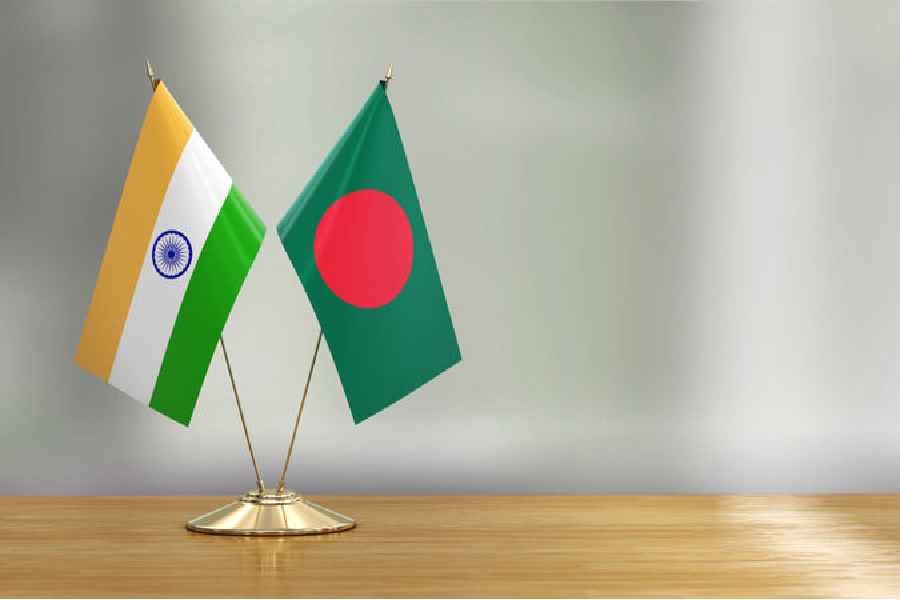Sheikh Hasina’s downfall comes as a blow to India, which had through successive governments invested heavily not just in her government but also in her party, the Awami League.
Added to this are apprehensions about a possible influx of refugees to the states bordering Bangladesh.
For hours after Hasina fled Dhaka and later headed to India, the Narendra Modi government refrained from commenting on the Bangladesh situation even while allowing her aircraft to land at the Hindon airbase in the National Capital Region.
There is no official word on what the arrangement is with her: Will she fly to London where she is said to have sought asylum, or is she going to take refuge in India?
Since Parliament is in session, the government has a ready excuse for remaining tight-lipped amid reports that external affairs minister S. Jaishankar has briefed Modi on the developments in Bangladesh and national security adviser Ajit Doval met Hasina at Hindon on arrival.
Given the mood on the streets of Bangladesh, it is natural that India would
not be keen on being visibly too welcoming of Hasina at a time when its high commission in Dhaka and missions in Chittagong, Khulna, Rajshahi and Sylhet are still functional.
The safety of the Indian mission staff and their families would be of primary concern, more so after the vandalism at the Indira Gandhi Cultural Centre in Dhaka and the damage to four temples in mob frenzy during the day.
Besides, about 7,000 Indians live in Bangladesh, according to the external affairs ministry.
India has anyway been facing the backlash of New Delhi’s long-time association with Hasina and the Awami League.
The Modi government’s outward refusal to comment on what was widely perceived to be a rigged election in Bangladesh earlier this year — even differing with the US in the process — was seen as an endorsement of an increasingly unpopular Hasina.
Under Hasina, Bangladesh was the last overtly friendly government India had in its immediate neighbourhood.
The consensus among policy wonks is that Hasina’s ouster is a big setback for India.
“If Sheikh Hasina falls, India may be left with Bhutan, Mauritius and Seychelles as the last remaining friendly and stable neighbours. Afghanistan, Maldives, Myanmar, Pakistan all lost. Nepal and Sri Lanka continue to wobble. Challenging times, as China looms,” international relations professor Ian Hall posted on Sunday.
Amitabh Mattoo, dean of JNU’s School of International Studies, tagged both Modi and Jaishankar as he put up a post on X saying: “Time for the Indian leadership to act with clarity & fortitude in Bangladesh. The fall of Dhaka could be the first Domino in the fall of South Asia to anti-India forces!”
Former foreign secretary Nirupama Menon Rao advocated caution, recalling how, five decades ago, India had assisted the birth of Bangladesh in response to a grassroots people’s movement despite opposition from China and the US “in a glorious exercise of our strategic autonomy”.
“Today, as we see momentous happenings in Bangladesh and when the voice of the people has seen the flight of Prime Minister Sheikh Hasina from the country, we must weigh our reactions and policy moves with both caution and a capacity to think on our feet with agility, a clear focus and foresight,” she said.
“We cannot afford any misstep. There are strategic dilemmas involved here. Whatever we do, we must protect our long-term national interest.”
Another aspect on which there is consensus is that Hasina’s departure signals the backsliding of secular politics in Bangladesh.
“Massive geopolitical setback for India. A moderate progressive Bangladesh was made possible through enormous Indian sacrifices in 1971,” posted international
relations author Zorawar Daulet Singh.
“This has been snatched away by extremists who have toppled the democratically elected government, while India witnessed these events on its periphery helplessly.”
Hasina had during her India visits in recent years indicated that India’s own deviation from secularism on the Modi government’s watch had made it difficult for her to control the fundamentalists in Bangladesh.
In October 2019, while addressing the World Economic Forum here, Hasina made two rather loaded statements that were construed as a comment on the dominant politics in present-day India in general and the Modi government in particular.
Speaking about the region as a whole, she had said: “We should move beyond the majority-minority mindset. Pluralism has been a strength of South Asian countries. We should be able to celebrate South Asia’s regional, ethnic and linguistic diversity. This is fundamental.”
That visit had come amid the raging controversy in India over the Citizenship Amendment Act.











